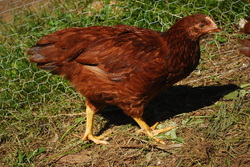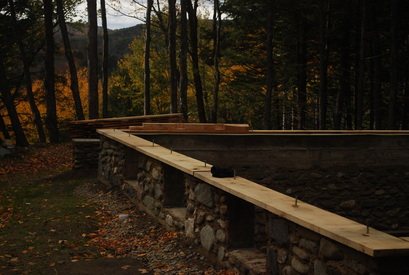 I started writing this post as a comment for an article on huffingtonpost.com (or more specifically as a comment on the other comments. You can read the article here.) Green Mountain College in Vermont is going to be slaughtering their farm's oxen team and using the meat to feed the students. This has created an uproar across the internet, seemingly mostly with people who don't go to the college. I wanted to elevate the discussion above finger pointing and name calling, because we're dealing with these same issues on our farm right now, and it can be helpful to have differing opinions. (Who woulda thunk it?!) In this internet world of forced brevity, my comment was too long to post (actually, I believe it was 386 words over the limit of 250). So instead of altering my thoughts to fit into their website, I'm altering the website where I write it, to fit my thoughts. Enjoy. Unfortunately, as usual these difficult issues seem to set people into a place of dictating to each other, rather than using questioning as a way to help clarify the issue for themselves. I would like to inject my voice here as a farmer in southern Vermont. I have been working on vegetable farms for 7 years now, and over the past 3 years my partner and I have started our own. Part of this process has been to start a flock of laying hens, and we also have plans of more livestock to come. I think something most people don't understand is that even if you don't eat meat (which I haven't for over ten years now), it's very hard to find examples of how to farm without needing animal inputs. The standard way to organically fertilize vegetable plots around here is to use animal (usually dairy cow) manure. Remember that in order for dairy cows to be lactating, they need to be calving for the duration of their productive life. If they have bull calves, they are usually used for meat (with the occasional exception used for breeding stock.) If you eat diary (and I do), you are linked into these processes. So let's assume that you don't want to use their manure. If you don't have the privilege (and most do not) to have extremely fertile alluvial soils, then the only way to support perpetual vegetable growth is to add fertility annually. Using plants as green manures is another option, though to do that you need to have large gas or diesel-powered equipment in order to incorporate all of the plant matter into the soil. That brings up a whole other side to this discussion, which is that the main alternative to animal manure is petroleum based fertilizer. I'm hard pressed to think of how that is a better option, considering the large scale environmental degradations associated with it. I think the important thing is for us to understand that there is no easy answer. In order for us to live, it requires the death of other creatures. There is no way around this fact of nature. So it would be helpful to give the discussion the level of serious consideration it deserves. I believe anyone who claims they have the obvious guilt-free solution hasn't truly looked into all parts of these processes. Our culture has divorced us from most of the basic parts of life sustenance, and it's hard to come face to face with them lacking informed context. Even though I haven't eaten meat in ten years, last week I killed my first chicken, because she was eating her eggs, and it's a habit that spreads through the flock if not removed. This was a very difficult thing to do, and I'm continuing to try to understand what it means for me. But, we all have to remember that farming is practiced in an economic context. We lose money on selling eggs unless the flock is highly productive. Even for farmers such as myself who are trying to live on as little money as possible, it's very hard to figure out a way to do so without these decisions being made. Anyone who thinks that this is not the case I would have to think is not trying to make a living at it themselves. I'm not to any place of final resolution. There are so many other ways that death is interlinked with farming that can't be given adequate space in a comment posting. I don't know that there is one single place we can arrive where this is agreed upon, or even understood within ourselves. But let's try to move in that direction by continuing to talk about it without stubbornly taking sides.
3 Comments
 The westerly view from our house-becoming. Hello--whoever you are. Is anybody actually reading this? Maybe you're only me, proofreading my own post? That's a weird thing about sending thoughts onto the internet. Here I am, practicing a life with each action intended to create physical results, ones that I can pick up and hold, or lean against, or ingest, or burn, and this evening I am instead trying to alter my typical journal entry, which I usually write to myself, to help myself understand and develop myself's philosophical underpinnings, and this altered entry style is intended to do....what exactly? I'm not quite sure, but if you actually are someone other than me, then bear with me, and see if it does anything for you. Today we spent most of the day doing joinery work on our sill beams. This entailed much sawing, measuring, chiseling, mortising, etc. These beams will hold the timber girders and joists, which will in turn hold the flooring on which we will walk. I really enjoy this part of the house work. It is not as physically taxing as rolling logs with peaveys (long poles with hooks), it is not as loud or exhaust-producing as milling the logs to beams, it is not as weighty as ending the life of a defenseless tree (whatever beam I'm working on has already had that decision made by us in the past), and satisfying results are within a single-day's reach. I like to envision where exactly this post or beam will rest in our house, what part of the structure it will support, what activities I will do for years to come on top of or next to it. All of these thoughts motivate me in my work. And all of these thoughts also serve as long-term understanding for my mixed feelings about taking these trees' lives. I'm sure much of the confusion in me is simply the result of having had a typical contemporary American existence until my early to mid-twenties. That is to say, I had no real, personal idea of what the ramifications were of any of my actions. Though, even if this was an earlier century when most people had direct knowledge of their impacts by necessity, I still think it is always a valid exercise to question any action--routine or otherwise. As we start to establish routine in our work here at the homestead, we often contextualize our choices based on our hiking and other long-term travel experiences from years past. I have spent so much of my life as passive traveler in all types of woods, from marginal to majestic. They have been the backdrop to the play that is my life. The clearing of forest is no small decision in my eyes. Like John Muir said, "Any fool can destroy trees. They cannot run away; and if they could, they would still be destroyed - chased and hunted down as long as fun or a dollar could be got out of their bark hides....God has cared for these trees, saved them from drought, disease, avalanches, and a thousand straining, leveling tempests and floods; but he cannot save them from fools..." So it is with strong intent at wise action that we see a tree in this forest, and make that critical decision, to end it's life in the service of ours. I cannot compare this experience of familiarity and intimacy with the wood from an individual tree to any prior. Unlike the purchase of forest-derived products from the national chain-store, this experience is in no way an economic one. It is far too enriching to be that. And, if I buy boards from the lumberyard, I may intellectually understand what it took for those items to become what they are, but I can never know them in the sense that I know these beams we cut and chisel today. I saw the hemlock standing in it's rightful place, I counted all one hundred and thirty growth rings, and I feel much responsibility for honoring that fact of life. |
Meggie
Recording moments from our journey on the Pacific Crest Trail. (All pre-2015 entries are Patrick's words on work and life at the homestead). Archives
March 2016
Categories |
 RSS Feed
RSS Feed
